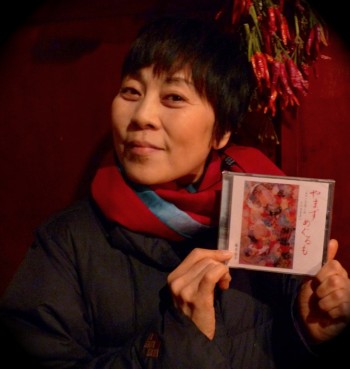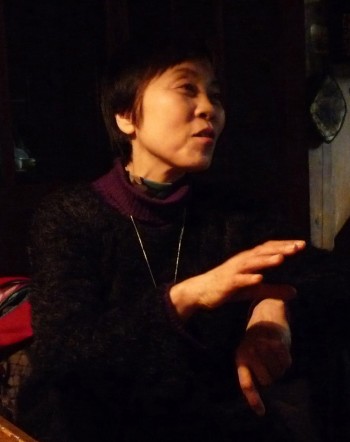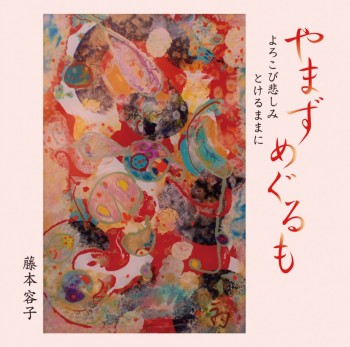CD “Yamazu Megurumo”: An Interview with Yoko Fujimoto by Johnny Wales
CD “Yamazu Megurumo”
An Interview with Yoko Fujimoto by Johnny Wales
On March 3rd Yoko Fujimoto released her 2nd solo album ‘Yamazu Megurumo’ (Circle of Life) with Otodaiku. You can order her CD at the Kodo Online Store.
The seed for this project was when my mother in Tokyo became ill and I wondered what I could best do for her living so far away. Well, for me, that is singing. So that’s how it began, a private thing for mum.
I began to think about how life is one long continuous line from time immemorial to now. And relationships – just when you think one might be over – What?! It’s started up again! The ties that bind are re-tied. I wanted to express in song how extraordinary a thing life is, how it renews itself, carrying on in a never-ending cycle. I will be happy if – in some small way – these songs serve as a comfort and encouragement to people who hear them. Incidentally, mum is much better now.
I saw a wonderful Italian movie, “L’uomo che verrà” (The Man Who Will Come) in which an 8 year old girl and her newborn brother are left alone in a mountain village in Italy during the war. Her other little brother had died in her arms the year before and from that shock she lost her ability to speak. She resolves to do anything and everything she can to protect him. The movie ends with her finding her voice by breaking into a lullaby to her little brother. Even this tiny, seemingly powerless girl found the strength to carry on the line of life. And so it has ever been. This power that has allowed our race to continue to this day. So I wrote a poem about that. Then I learned the traditional Italian lullaby from the movie and began singing it.
As it happened last year was a very confusing time for me, there were so many changes in my life. I was even thinking about quitting singing for good. A close friend said to me, ‘Stop being confused! You have been blessed with the chance to sing with Kodo for 30 years, stop whining!’ She opened my eyes. I showed her my poem. She said, ‘You should do this! Make this into a song!’. That friend who helped is an abstract painter. I wanted to use one of her paintings on the CD cover. She asked me the name of the CD project and I told her, ‘Circle of Life’ and she said, ‘Wait there!’ and disappeared into another room. She reappeared with a smallish painting and said ‘This is my favourite painting! And its called ‘Circle of Life’ (Meguru Inochi). That settled it.
I first recorded the songs with no accompaniment and sent them to Shunsuke Kimura who laid down the accompaniment. He played fue (bamboo flute) and some Japanese percussion, and added other musicians on Tsugaru shamisen, wadaiko, 13 and 17 string kotos, world music percussion and violin.

Yoko with her new album “Yamazu Megurumo”
The first song on the album is called ‘Pinwheels’ and is a Japanese kindergarten song from the Meiji Period (1868-1912). The lyrics tell how a pinwheel spins endlessly when the wind blows, a waterwheel turns endlessly when the water flows. I took the title for the album from this song. The second song, ‘Ororo Pinne’is an Ainu (Japanese aboriginal) song about the creatures of the forest. In the middle of the piece I do some free voicing. The words are in the Ainu language. When I was at the lowest point in my life I used to go to Sobama Beach here on Sado and hum this tune. So that is why this song is so significant to me, as if this ancient song awoke me from a slumber.
The third number, ‘A Child’s Flower Song’ is based on a poem written by a Sado farmer to which I put music. When he was little he loved ‘playing house’ with his older sisters. I was so impressed with it I asked his permission to turn it into a song. In his poem the children form Sado of about 70 years ago come to life.
The fourth song which I entitled Martina’s Lullaby is the traditional Bolognese lullaby sung by the little girl at the end of the movie I told you about.
The next song is called ‘Stars and Dandelions’. The words are a poem written by a Japanese poet Misuzu Kaneko (1903-1930) to which I set music. It says that you can’t see the stars in the sky in the daytime, but you can in the dark. They are there even when you can’t see them. A dandelion sheds its seeds and withers in the Fall but over the winter they are hiding beneath the roof tiles, waiting to emerge with the coming of Spring. She is singing about life, which has a beauty and power that you can’t always see.
The next number is the ‘Harvest Song’, a Taiwanese aboriginal song for which I wrote Japanese lyrics. It’s about the straightforward joy of harvest.
The last piece is called ‘Hinei Ma Tov’ and is a Jewish sacred song. ‘Welcome! Welcome! It’s such a beautiful day, Let’s sing!’ I loved that meaning so I made some Japanese lyrics for it. Whenever I do a voice workshop I finish up with us all singing this. It’s a song about the happiness of being able to spend this time together.
This CD is produced by Sanya Projects, which is the umbrella name under which from now on all my solo activities will occur. The Tibetan word Sanya (Śūnyatā in Sanskrit) means Nothingness.
No matter what nationality, race or creed there is a connection at the root of human hearts. I believe that songs born from that root resonate within the hearts of people, no matter what their differences. I have chosen songs about that unbroken cycle of relationships and life from which I have learned, and been given strength.
Yamazu Megurumo
Tracklist
- Kaza-guruma [Pinwheels] (Kindergarten song from Meiji Era)
- Ororo Pinne (Ainu folksong)
- Hana no Warabe-uta: Sado no Warabe Uta [Flower Nursery Song: Sado Nursery Song] (Song: Masaji Homma / Music: Yoko Fujimoto)
- Martina’s Lullaby (Music: From Italian film “L’uomo che verra” (The Man Who Will Come) / Song: Yoko Fujimoto)
- Hoshi to Tanpopo [Stars & Dandelions] (Song: Misuzu Kaneko / Music: Yoko Fujimoto)
- Minori-uta [Harvest Song] (Amis Harvest Song, Taiwan)
- Hinei Ma Tov (Jewish hymn / Japanese song: Yoko Fujimoto)





